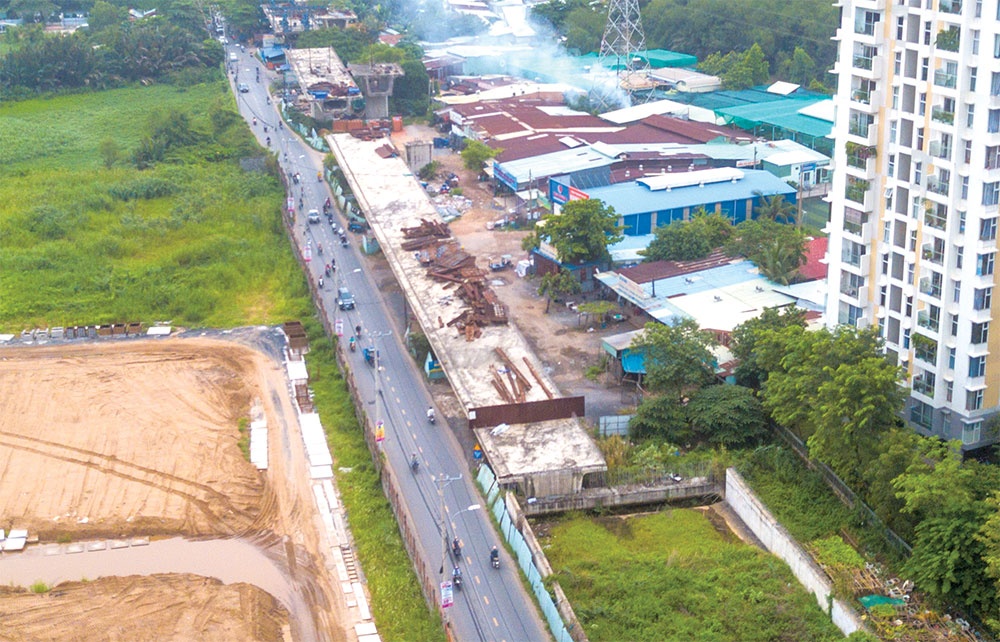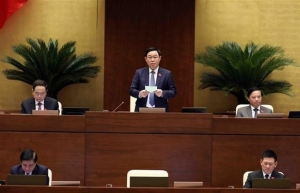Learning recent lessons to ensure fiscal prudence in 2023
Vietnam has applied many measures including fiscal and monetary policies to boost its economic recovery and development in 2022. What is your take on them?
 |
| Nguyen Minh Cuong, principal country economist at the Asian Development Bank in Vietnam |
By late 2022, under the Asian Development Bank’s statistics, all Asian countries have increased interest rates by nearly 70 times, while the number was only 20 in 2021. The intensity of the rate hikes was also very high, by 60-70 percentage points, reflecting a trend of monetary tightening. Meanwhile, many nations still applied a flexible stance in their fiscal policy or public investment disbursement.
Vietnam has joined this trend. Inflationary risks in many countries remain significant through cost-push inflation – in other words, importing inflation – especially via appreciating exchange rates of US dollar versus local currency. The State Bank of Vietnam (SBV) has applied a tight monetary policy in its policy monitoring. The tightening monetary policy in line with the global trend, may not cause major shocks to the economy. Some have said that in the year’s end, the SBV caused a shock by its increasing the interest rates twice, but reality showed that the economy would still have been able to absorb such hikes if there had been no irregularities of the corporate bond market. In fact, these irregularities have eroded confidence and affected the monetary policy.
Do you see any headwinds for Vietnam this year?
We often discuss headwinds but tailwinds can also be significant, and they are bright spots in the global economy in 2023 including in Vietnam.
Firstly, it is the Fed’s policy shift when it has begun to mitigate the intensity of interest rate hikes, and this has helped subdue pressure on Vietnam’s exchange rates. Declining exchange rate of USD and VND will relieve pressure on the country’s monetary policy.
Secondly, China has opened its doors to the world, creating opportunities for Vietnam. Of course, China’s move may also create pressure on the global energy market. Next, although the US economy is slowing down significantly, it can likely avoid a recession. This may still therefore give Vietnam export opportunities.
Finally, ASEAN member states are maintaining good growth momentum. ASEAN is the fourth-largest export market of Vietnam. Those ahead of Vietnam have been doing a good job in controlling inflation and maintaining growth – and this is a massive opportunity for Vietnam.
What about the likely challenges?
Challenges still remain in Vietnam this year and they come largely from the structural problems of the economy. For example, in the capital market, Vietnam has yet to fully develop the capital market efficiently, especially the corporate bond market.
Meanwhile, there is confusion between rescuing real estate with maintaining liquidity and stability of the financial market. Or to put it another way, when dealing with problems related to the capital market, almost everyone thinks about rescuing the real estate market. It is true that real estate investment in the past time accounted for a gigantic part of the corporate bond market, especially through private placement, but that does not mean the liquidity settlement of the economy is equated with the rescue of the real estate market. This has clearly revealed the structural weakness of the Vietnamese economy.
 |
| Photo: Le Toan |
How should fiscal and monetary policies be deployed to help the economy overcome difficulties?
Public investment will be the main growth driver in 2023. However, the disbursement of public investment has always been lower than planned over the past years.
Monetary policy played a positive and effective role in 2022, and still needs to be cautious with inflation in 2023. Inflation risks are still looming, especially when China’s opening has a strong impact on oil prices. However, in the context of inflation risks, the monetary policy should still maintain flexibility and combine interest rate, exchange rate, and credit policies.
The room for the monetary policy has shrunk considerably. The SBV raised interest rates twice in 2022. Foreign exchange reserves are close to three months’ imports. Inflation risks and pressure on the exchange rate may still appear in 2023, so little room may be there for the policy.
In addition, the liquidity of the banking system has decreased; the ratio of short-term capital for medium- and long-term loans increased; and incomes from interest and fees of bank came under pressure by late 2022 and will continue to do so in 2023. The loan-to-deposit ratio of many banks has exceeded the safety level, and bad debt is also on the rise.
Therefore, if we continue to use monetary policy and pressure on the banking system for the recovery of growth, especially in dealing with problems of the capital market, it may cause many consequences for the banking system in the long term.
It is necessary to learn from 2022. The fiscal policy should assume a bigger role, through increasing government spending and accelerating public investment, which would have multiplier impacts on the economy, including liquidity handling. These measures are important to offload burden on the monetary policy, especially on the banking system.
 | NA leader urges prompt implementation of fiscal, monetary policies to aid recovery Chairman of the National Assembly (NA) Vuong Dinh Hue on June 8 demanded prompt implementation of fiscal and monetary policies to support the socio-economic recovery and development programme. |
 | Credit growth of banking system expands by over 17 per cent Hanoi - Credit of the Vietnamese banking system as of June 9 surged by 17.09 per cent against the same period last year, deputy governor of the State Bank of Vietnam (SBV) Dao Minh Tu said. |
What the stars mean:
★ Poor ★ ★ Promising ★★★ Good ★★★★ Very good ★★★★★ Exceptional
Related Contents
Latest News
More News
- Foreign-language trademarks gain traction in Vietnam (February 06, 2026 | 09:26)
- Vietnam breaks into Top 10 countries and regions for LEED outside the US (February 05, 2026 | 17:56)
- Seafood exports rise in January (February 05, 2026 | 17:31)
- New rules ease foreign access to Vietnam equities (February 05, 2026 | 17:29)
- Ekko raises $4.2 million to improve employee retention and financial wellbeing (February 05, 2026 | 17:28)
- 0.1 per cent tax proposed on each transfer of digital assets (February 05, 2026 | 17:27)
- Food safety law issues addressed (February 05, 2026 | 17:27)
- Ministry of Finance tightens policy delivery at start of year (February 05, 2026 | 17:26)
- Pegasus Tech Ventures steps up Vietnam focus (February 05, 2026 | 17:25)
- US firms deepen energy engagement with Vietnam (February 05, 2026 | 17:23)

 Tag:
Tag:

















 Mobile Version
Mobile Version